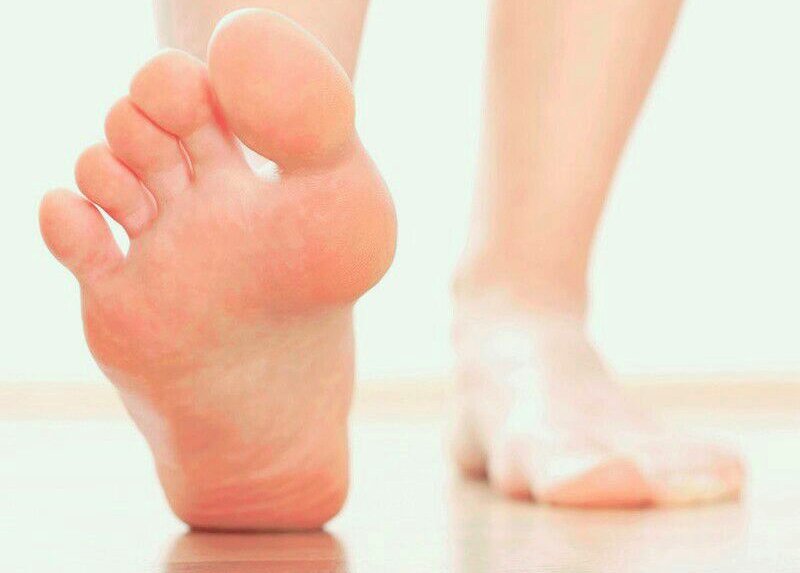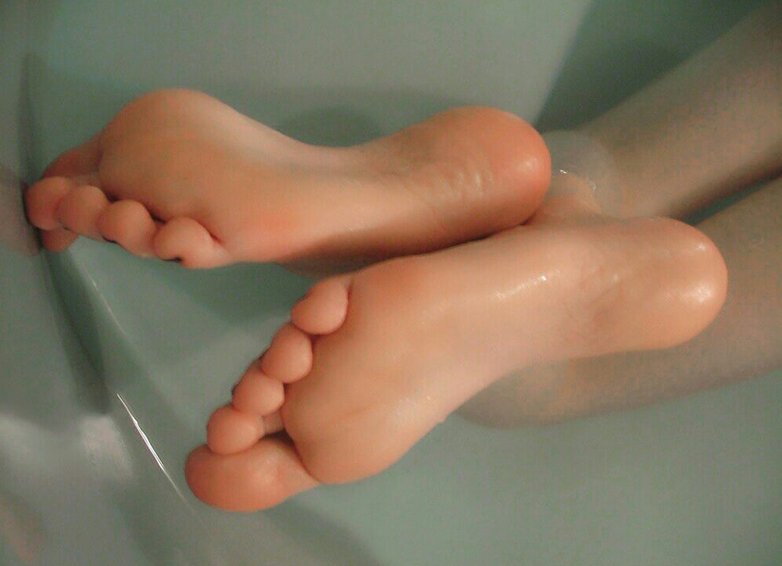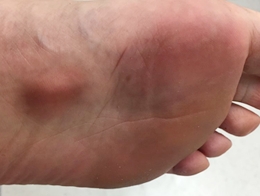Sweaty Feet
Sweaty feet is a common condition that almost everyone has suffered from sometime in their life but wish they had not. Smelly Sweaty feet can cause an embarrassing foot odor along with other problems. Get to know more information about this condition including the causes, symptoms, how to treat it, and most important, how to prevent sweaty feet.

Just on one foot alone there are more than two hundred and fifty thousand sweat glands, producing about a half pint of moisture, or sweat, each day. There are more sweat glands per inch on your feet than anywhere else on your body. This makes sense why there are approximately two percent of the people around the world, both adults and children, suffer from sweaty stinky feet. It usually affects men and younger adults more than women and older adults.
Most of the time the sweat will quickly evaporate but for others the sweat becomes trapped within the glands. The medical term for this condition is plantar hyperhidrosis, which means the plantar, or bottom, side of your foot. In addition to having sweaty feet this condition is often accompanied with sweaty hands and/or sweaty armpits. Generally people will sweat when they become warm or it is hot outside but those that have this condition sweat almost all the time.
There are many causes as to why this medical condition happens. It is not usually a severe condition but more of a minor temporary annoyance. Sweaty feet is often associated with hormonal changes. It can cause problems with fungus, foot odor, ruin shoes, make it hard to wear sandals, and problems with relationships.
There are two types of plantar hyperhidrosis, which include:
- Primary: this is an inherited condition that will usually develop during adolescence
- Secondary: this type develops later in life and usually tends to be a symptom of something more serious. Conditions like diabetes, tumors, menopause can cause thyroid dysfunction that can lead to this type of hyperhidrosis.
Having constant sweaty feet is not only uncomfortable but can also cause problems such as foot odor, which can cause staining and damage to the insoles of shoes like sandals. It has also been linked to having a higher risk for developing fungal and bacterial infections on the toenails and feet, like plantar warts, or athlete’s feet. Depending on what causes your sweaty feet it can be very difficult or very easy to solve and treat.
Symptoms of Sweaty feet
The key symptom is water production that is immersed with solids that are dissolved and produced excessively by your sweat glands, which are found all over your body. The highest concentration of all the body’s sweat glands can be found in the region of your feet, groin, armpits, and hands. The basic symptoms can exacerbate through anxiety and stress. Other symptoms can include:
- Foul smell, which is caused by the bacteria on your feet interacting with the extra sweat.
- Peeling skin
- Itching
- Toenail fungus that can cause yellow toenails
- Redness
- Burning sensations
- Your feet may slip around in your shoes if you sweat too much
- Your feet may have a wet whitish appearance
- Foot infections
- Emotional stress and worry about their sweaty foot odor
- Blisters
- Rash that can look like eczema
- Dead skin
- Itchy bumps
What Causes Sweaty Feet?

Sweaty feet have many causes but generally it happens when your sweat glands are signaled to produce sweat in your feet too often. What causes this extra signaling is not known but it has been linked to periods of stress at times. The overactive sweat glands in your feet are often seen in people under the age of 25 and adolescents. Their sweat glands are triggered by the changing hormone levels in their body, causing them to become overactive. Because it often happens to adolescents when they are experiencing changing hormone levels they can develop sweaty feet all of a sudden with no warning. Other causes can include:
- Genetic conditions: research has shown that if a close family member experiences sweaty feet the chance to develop this condition increases.
- Simple lifestyle choices like exercise, diet, and hygiene
- Acquired diseases
- Poor footwear
- Continually wearing covered shoes in the winter and not letting the extra fluids and water to escape the sweat glands and skin pores
- Hormonal imbalances in your body can stimulate your sweat glands causing sweaty feet.
- Menopause in women
- Hyperactive thyroid gland
- If you are taking some medication that does not suit you it can produce different side effects like cold sweaty feet at night and during the day.
- Chain smoking
- Excessive drinking
- Certain health conditions like heart diseases, lymphoma, and leukemia
- Stress and/or anxiety because sweating is a natural way for your body to cool itself.
- Wearing socks that are one hundred percent cotton or made of nylon can act like a sponge and lock the sweat in, keeping your feet wet all the time.
- Vitamin deficiency
One of the main causes is poor hygiene, which includes not washing your feet or changing socks. Either of these will allow sweat levels and bacteria to build up on their feet. When this happens it will increase the smell and toxicity which is caused by bacteria-creating amino acids. Having a toxicity level that is high can also be caused by low levels of water and little to no exercise. Another possible cause of sweaty feet is eating foods that are high in saturated fats and eating a lot of spices. If your feet are covered in shoes and socks all the time it restricts the natural evaporation of sweat into the atmosphere. Sometimes during a woman’s pregnancy it could be a warning sign of a possible miscarriage or ectopic pregnancy.
How to Treat Sweaty Feet?
If the cause of sweaty feet is due to your lifestyle and/or hygiene either of these is usually easy to treat. All you would need to do is make some basic changes to your lifestyle such as eating a diet that is healthier and includes a lot of vegetables and fruits instead of saturated fats and spices.
With plantar hyperhidrosis it is a condition that may not be able to be controlled by using normal antiperspirants and foot odor control products so it may be necessary to see your physician for treatment. When you see your physician there are several things that they can recommend to help with sweaty feet. One of the first things that they may try is giving you a prescription for an antiperspirant for your feet. It is normally applied one or two times a day. If your sweaty feet do not respond to the prescription antiperspirant there are other treatments. These can include:
- Drug treatment using anticholinergic drugs, which is a class of medications that block the action of the neurotransmitter acetylcholine in your brain.
- Botox injections, which last from six to nine months
- Minor electrical shock treatment to your feet
- Surgery
If your physician chooses surgery there are two types of surgery that can be performed.
- Removing the sweat glands in your feet
- Severing the communication from the sweat glands to the nerves that are signaling them.
Surgery is normally the last treatment considered because many patients respond to less invasive treatment, especially if they implement home remedy treatments with the treatment prescribed by your physician.
Prevention
 One way to prevent sweaty feet is to keep your feet dry. There are three ways that you can effectively do this:
One way to prevent sweaty feet is to keep your feet dry. There are three ways that you can effectively do this:
- Before you put on your socks and shoes apply a layer of talcum powder to your feet. The powder will clog your skin pores, preventing sweating for some time and help to reduce the foul smell.
- Use a salt water solution to keep your feet dry. Add 5 to 6 tablespoons of table salt to a half tub of water and mix well. Soak your feet for 10 minutes and then wash with normal regular water. After patting your feet dry apply a moisturizer that is oil-free.
- Always make sure that your feet are completely dry after bathing, showering, swimming, or any activity that gets them wet. You can use a hairdryer on the cool setting to make sure that they are dry. Make sure that the area between your toes is also dry. Once they are dry use an antiperspirant to the bottom of your feet.
Other ways that you can help prevent sweaty feet includes:
- Wear socks made of less than fifty percent cotton, acrylic, wool, or a synthetic-blend, moisture-wicking socks.
- Footwear in some type of breathable material, like canvas or leather. Wear open footwear when you can. Run barefoot around the house.
- Put moisture-blocking insoles in your shoes.
- Do not let sweat build up on your feet because it can lead to sweaty feet and bacteria infestation. Use a good medicated or antibacterial soap, using it to wash your feet, including between your toes, in the morning, evening, and before you go to bed. After playing a sport, exercise, running, aerobics, wash your feet immediately afterward so the sweat does not remain on your feet too long
- Shower or bathe daily
- Changing your socks twice a day
- Work on practices and exercises that can help to reduce stress, which can include learning meditation, learning to do yoga or Tai chi, and deep breathing exercises.
- If you are overweight try to lose the extra pounds so your rate of metabolism and help to control excessive sweating
- Use anti-fungal foot powders or spray, or cornstarch, or baking soda on your feet
- Rotate your shoes, allowing them to dry out between uses.





